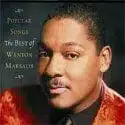
First names of jazz: Louis; Charlie; Dizzy; Billie; Thelonious; Miles; Ornette; Wynton…
Wynton?
Popular Songs: The Best of Wynton Marsalis celebrates Wynton Marsalis’s 40th birthday, which is also, coincidentally, the 40th anniversary of the death of jazz. Wynton Marsalis was born in ’61, just when Ornette Coleman, Don Cherry and Cecil Taylor were “fucking up everybody” (Miles Davis) on the NY scene. Soon after that final effusion, jazz dried up like a Kool Filter in the Vietnam sunshine. Miles courted Jimi. New water filled the fountain. The serpent grew a mandala skin of Hendrix’s “Star Spangled Banner”, Sly’s There’s A Riot Goin’ On, Beefheart’s Trout Mask Replica and The Stooges’ Fun House. Sometime in the late ’60s, the cosmic coroner pronounced jazz dead, and in 2001 its phases have been reduced to a few essential spices tossed in the stew (a Miles-ish trumpet phrase here, a flurry of Trane-ish sax there) for emotive flavor. The other major sign of jazz’s death on the streets is its rebirth in the academy: thousands of goateed geeks transcribing Wes Montgomery solos annually for their Masters theses.
And now, ta-da! Wynton Marsalis! Wynton came on the scene in the mid-’80s with an agenda. He swore he would do for jazz what Huey Lewis had done for rock, and what Robert Cray had done for blues: make music safe for stockbrokers.
As French sociologist Jean Baudrillard was proclaiming the death of the real and the emergence of the society of simulation, images of “authenticity” seemed to proliferate everywhere in the media, but especially in music videos. Springsteen and Mellencamp ponced around in ripped denims and muscle shirts like a pair of aging leathermen at the Mineshaft. Bono posed in Harlem with some old blues singer, backed himself with gospel choirs, and wrote about MLK and angels of Harlem to fictionalize some sort of connection between the innate nitty-grittiness of all things black and the attenuated, drama-queen, Euro-pop that he and U2 represented. To crown all this, like the plastic bridegroom atop the wedding cake of ’80s music, Wynton Marsalis plunged into the frosting in his three button suit, wingtips, and horn with a subliminal sign around his neck that flashed: “authentic-’50s-style-jazz-musician”.
Just to remind his listeners that jazz was a black thing loaded with radical street cred, but was also a stylish, upwardly mobile, listen-in-your-limo-sipping-Dom-Perignon sign of cultural capital, and that he, Wynton, embodied all things black, booty-ful and seriously suave, he gave his CDs portentous titles like Black Codes (From The Underground) and Uptown Ruler — Soul Gestures In Southern Blue Vol. 2. Of course the Wall Street boys instantly recognized Wynton as just the kind of garland they wanted in their lapels, and proceeded to appropriate his “jazz” for their bachelor pads and office elevators.
“Dude! It’s jazz!” “Jazz dude? Cool!”
Jazz with titles like “Root Groove” and “Down Home with Homey”, just reeking of that totally bitchin’ combo of finger-lickin’ funkiness and know-it-all sophistication. Plus the guy even played “classical”, and to people who really know their music, well that just says it all. I mean classical dude, come on.
I saw Wynton once. He played a gig at the university I attended in the ’80s. His drummer was the best I ever heard. He brought more tone, light and shade, depth and brightness out of one cymbal stroke than most drummers can produce in a half hour solo. Wynton wore a beautiful suit and he played for one hour, remote and flawless, like he was going to fulfill the terms of his contract with this midwestern university and its polite and respectful audience of music majors, and give not one note more or less. For the last tune, he carefully inserted a mute in the bell of his horn and began to play some minimal, Miles-ish melody. The mute fell out with a thump at his feet. For a moment, Wynton looked down and weighed his options. The tune was obviously meant to be played with a mute, or he wouldn’t have been using it. He shrugged and went on without it. Either the gig didn’t seem important enough for him to bother, or he just wasn’t ready to give whatever it would have taken to bend down and pick up the mute.
So what’s this CD like? It’s Wynton man.
